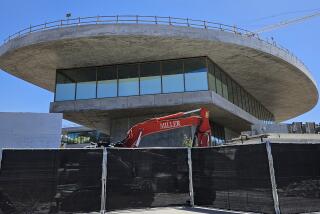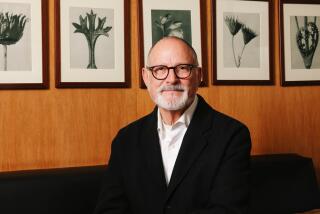Petersen Automotive Museum offers details of renovation plan
- Share via
The Petersen Automotive Museum provided more details Sunday of its planned renovation, saying it will spend as much as $20 million to remodel its Wilshire Boulevard facility and add about 15,000 feet of display space.
The details were unveiled by Peter Mullin, an avid car collector and chairman of the museum’s board, at the Pebble Beach Concours d’Elegance classic car show in Pebble Beach, Calif.
“As we approach the Petersen Automotive Museum’s 20th anniversary, our goal is to design and build an exterior as stunning as the vehicles and displays housed inside,” Mullin said. “Our plan is to work with the best and brightest minds in architecture, automotive history and interactive design to give the people of Los Angeles and the world a place where they can be immersed in the culture, sights and sounds of the greatest vehicles ever built.”
FULL COVERAGE: Monterey Car Week, Pebble Beach Concours d’Elegance
The museum has come under fire for selling cars from its collection to help pay for the building renovation.
Already, the Petersen has sold about $10 million in vehicles, including a Duesenberg once owned by dancer and actor Bill “Bojangles” Robinson, who often starred with Shirley Temple in pre-World War II movies. Other sales include a 1995 Ferrari F50 that went for $1.375 million. A 2006 Bugatti Veyron — the first sold in the U.S. — brought $924,000. A 1990 Ferrari F40 fetched $715,000.
Some of these vehicles cost a lot to maintain, Mullin said. Speaking of the Bugatti, Mullin said, “It’s a fantastic automobile, but its $30,000 a year to keep up a Veyron.”
PHOTOS: Highlights from Monterey Car Week
Petersen officials have declined to release a full list of the vehicles it has sold or plans to sell but have confimed a handful of the transactions. Speaking to reporters at the car show, Mullin gave the most detailed comments yet about the rationale behind the sales and the museum’s expansion plans.
Mullin said museum officials were concerned because about 70% of the Petersen’s visitors were first-time visitors and that the facility was not getting the type of repeat business that sustains such institutions.
“People say to themselves, ‘There’s no reason to go to the Petersen -- I’ve already been there,’” Mullin said. “That, of course, is the death knell of a museum.”
He’s hoping that refurbishment of the museum and an updating of its exhibits will push repeat visits to 60% of its daily attendance.
Money from the vehicle sales said will go to enhance the collection and enhance the galleries, and to restore existing cars, Mullin said.
The redesigned galleries will feature state-of-the-art lighting, digital displays and immersive learning stations, officials said. The permanent collection will feature “historically significant American and European classics, hot rods, groundbreaking race cars, the latest in alternative fuel technology, cars with Hollywood heritage and even vehicles designed and built in Los Angeles itself.”
Money to put a new façade on the building will come not from car sales but from a separate fund-raising campaign, Mullin said. Previously, museum officials have lumped all the renovation spending together in describing the project.
But by launching a separate campaign to raise money to change the outside of the building, the Petersen could blunt criticism over how it spends the money from car sales.
Museum industry ethics guidelines dictate that money raised from the sale of items in a collection be invested back into the collection. Using proceeds from collection sales to finance capital improvements is typically considered out of bounds, according to museum experts.
But the Petersen needed to whittle its collection, Mullin said.
Unlike a great piece of art, classic cars can require constant maintenance, Mullin said. “Two bad things happen to cars. They’re driven too much, or they’re not driven at all,” he said.
He placed the estimate of the vehicles the Petersen is selling or has sold at “about 100” of its roughly 400 cars. Counts provided by other museum officials have placed the number closer to 120.
Mullin said the Petersen found itself with too big an inventory of cars that weren’t always special. “We accepted any car that was given to it for the last 20 years,” he said.
He said donors were happy to get the charitable deduction.
“So we found ourselves overcrowded with cars that were never going to make a gallery,” Mullin said.
The updated museum will have a smaller, more manageable collection, supplemented by vehicle loans from collectors and other museums.
“We can’t really put in the display more than 200 plus at any given time,” Mullin said.
Follow me on Twitter (@LATimesJerry), Facebook and Google+.
ALSO:
VIDEO: Classic cars burn rubber at vintage races
In Monterey, car collectors race rare vintage vehicles
Review: 2014 Chevrolet Corvette Stingray Coupe shifts from tradition








